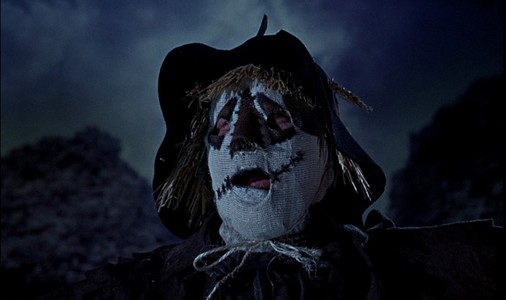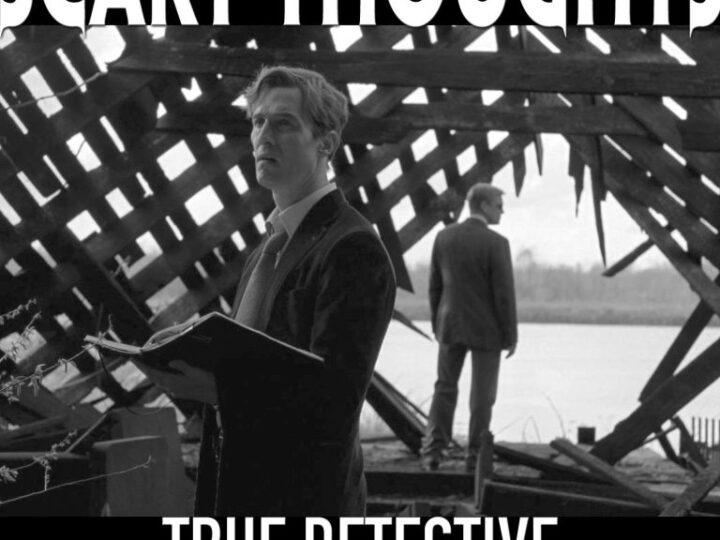
Zizek meets Hawthorne
In one of my favorite passages from the philosopher Slavoj Zizek, the slovenly Lacanian points to the difference between what Lacan called “the subject of enunciation” and the “subject of the enunciated.” The basic idea is that there is a yawning gap between every thing we can say about who we are and the empty, mute site from which such statements are launched. The positive “me” that I can describe and experience as a particular person with particular desires, thoughts, and memories is not the empty “I” who enunciates and temporarily identifies with these particulars. The cogito—Descartes’ “I think”—is crystal clear, but completely empty.
This crucial distinction comes up a lot in the more astringent flavors of spiritual inquiry, but it also pops up in pop culture. In an essay with the B-movie title “I or Her or It (the Thing) Which Thinks,” Zizek points out that this gap is beautifully captured in Blade Runner, a film whose complex of concepts and images I keep returning to year after year. The basic paradox is the “subject who knows he is a replicant.” If I am such a self-awakened replicant, I must recognize that my body, my eyes, and even my most intimate memories and fantasies are artifacts. The very “positive” material that constitutes my supposed humanity is cut off from me even though it is all the “me” I have.
The paradox of the replicant is a model of the fundamental split that biological humans have between the substantive me (all the stuff I do, my memories, my body) and the empty “I” of the cogito, the void that is constantly trying to ground itself. Awakening to this split means that in an almost structural sense we are much less human than we conventionally think—in this light, “awakening to our true nature” may be identical with embracing our inner android. But the condition of the replicants in Blade Runner also gives us an insight into the specifically emotional quality of this split, an emotion that paradoxically returns us to the authentically human. Here’s Zizek, tangled as usual:
The implicit thesis of Blade Runner is that replicants are pure subjects precisely insofar as they testify that every positive, substantial content, inclusive of the most intimate fantasies, is not “their own” but already implanted. In this precise sense, subject is by definition nostalgic, a subject of loss. Let us recall how, in Blade Runner, Rachel silently starts to cry when Deckard proves to her that she is a replicant. The silent grief over the loss of her “humanity,” the infinite longing to be or to become human again, although she knows it will never happen; or, conversely, the eternal gnawing doubt over whether I am truly human or just an android—it is these very undecided, intermediate states which make me human. [my emphasis]
We are already lost to our positive humanity, and yet the awakening to that condition, in its longing and mourning and insight into our condition, renders us, or the replicants, paradoxically human.
That’s a nifty posthuman koan, one worth keeping in mind as we navigate the mindfield of cognitive enhancement, body modification, and cyborg tech. But imagine my surprise when I stumbled across almost the same affective concept in a Nathaniel Hawthorne short story published in 1852.
I have been reading a lot of Hawthorne’s tales and sketches of late—he is a remarkable stylist, and his gloom and anxiety and gothic twists and turns seem to offer an enchanted path into aspects of American consciousness that seem more pressing at the moment than, say, the rival darkness of Poe. One complaint with Hawthorne is that the formal narrative characteristics of the stories are pretty conservative—the tales are openly allegorical, and it only takes a few pages for the reader to figure out the “meaning,” and thus the inevitable narrative culmination of the tale. This is bad form as far as the modern sensibility goes, where we expect fiction to surprise us with its twists and turns, or at least to not give away its end, and point, so obviously.
On the other hand, many of us continue to love the stories of H.P. Lovecraft, another New England brooder, and a writer who loved and was influenced by Hawthorne. Though Lovecraft is not allegorical, his stories often make the nature of the evil force in the tale apparent much more quickly to the reader than to the main character, so that much of the reading experience is, as with Hawthorne, waiting for the character to realize something that we have already figured out. I think this shared spirit has something to do with the determinist Calvinist strain of American Puritanism, whose long shadow even the rationalist nihilist Lovecraft was still writing under (not to mention Pynchon, or the poet Jack Spicer, who wrote, in 1965, “Mechanically we move / In God’s Universe, Unable to do / Without the grace or hatred of Him.”) After all, if it’s already been written, if the elect are the elect and the preterite are the preterite, then their stories too will seem, to the reader, already completed, already set in stone, with no more twists and turns than a knowing nod of the head.
The Hawthorne allegory I was reading was “Feathertop: A Moralized Legend.” In the tale, an old witch named Mother Rigby builds a scarecrow out of ruined clothes, sticks, and a pumpkin. She then puts a glamour on the stickman so that he appears to be a human being—and a particularly noble and well-dressed one at that. (The magic that keeps the scarecrow looking human is delightful: he must constantly puff tobacco smoke through his fancy meerschaum pipe.) Following the witch’s directions, the scarecrow Feathertop seeks out a pretty lass who he begins to woo in her parlor room. As she is falling in love with him, the girl turns to the mirror and sees Feathertop’s true form in the reflection of the mirror. She faints, and then Feathertop turns and sees the same stark reality:
The wretched simulacrum! We almost pity him. He threw up his arms with an expression of despair that went further than any of his previous manifestations towards vindicating his claims to be reckoned human; for, perchance the only time since this so often empty and deceptive life of mortals began its course, an illusion had seen and fully recognized itself.
It is not only vampires who must beware the mirror, it seems. Happy shaving, fellow pumpkinheads!




